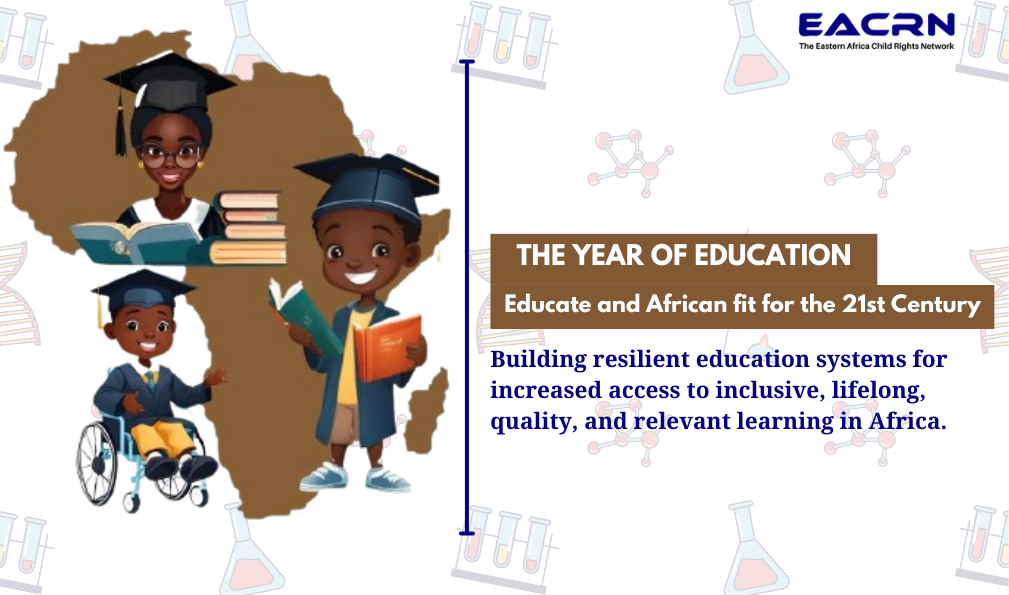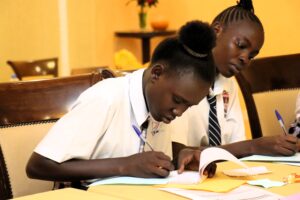Educate an African Fit for the 21st Century
The African Union has declared 2024 the year of education, with the theme being, Educate an African fit for the 21st century.- Building resilient education systems for increased access to inclusive, lifelong, quality, and relevant learning in Africa. The focus is on the development and implementation of effective, long-lasting, system-wide transformational strategies for education in Africa, and recovery from COVID-19, building resilience and transformation, and riding on the global momentum. The COVID-19 pandemic exacerbated the limitations of the current education models at all levels, compounding inequalities in education and squarely threatening to set back decades of progress, albeit insufficient, in Africa.
Read and download the AU concept note here: AU 2024 Theme
How can we promote effective education in Africa?
Despite the significant progress made in Africa, over the past two decades in terms of access, completion and quality of basic education, marginalized children in Africa still struggle to realize their rights to education. Limitations also continue to exist in teacher development in Africa, with recurrent teacher shortages coupled with a lack of professional development opportunities and low status and working conditions. To promote effective education in Africa, especially for the African child, we should;
- Promote free and fair education
Quality education is a basic human right that can drive economic growth, promote social equality, and benefit society as a whole. We should strive to promote a free and fair education for all children. Most of the dropouts in school are a result of families not being able to afford to take their children to school. Although most governments in Africa are trying their best to offer free education to their citizens, the question of quality education remains a major problem. In most cases, you will find instances of children overcrowding in class due to poor school infrastructure and a shortage of teachers. This leads to poor results in school due to some of the students requiring extra and special help. When education is free and fair, it can help break down barriers and create opportunities for children to achieve their full potential. By investing in education, we can create a more equitable and just society for future generations.
- Enrollment of more girls in schools
Over the past two decades, enrollment of our girl child in schools has really improved and we must commend governments, NGOs, CSOs and other stakeholders who have been at the forefront to ensure that the girl child is not left behind. We commend the government of Tanzania for allowing pregnant adolescent girls and teenage mothers to return to school, as it opens doors to a brighter future for them and their children. Despite the great progress in the region, there have been several challenges barring girls from freely attending and enjoying school. One of the major issues is the lack of provision of free sanitary pads in schools. Studies have shown that girls from poor families miss 20% of school days in a year due to a lack of sanitary towels. It is time we implement effective policies and direct more funds that will enable every school in the region to provide free sanitary towels for our girls and put an end to period shame.
- Inclusive Education.
According to UNICEF (https://www.unicef.org/education/inclusive-education), there are an estimated 240 million children with disabilities worldwide. Like all children, children with disabilities have ambitions and dreams for their futures. Like all children, they need quality education to develop their skills and realize their full potential. Yet, children with disabilities are often overlooked in policymaking, limiting their access to education and their ability to participate in social, economic and political life. Worldwide, these children are among the most likely to be out of school. They face persistent barriers to education stemming from discrimination, stigma and the routine failure of decision makers to incorporate disability into school services. Lack of enough teachers and caregivers for children with disabilities is a big concern in the region. We should change policies, which will allow teachers to build their capacities on how to integrate an all inclusive education. Integrating children with disabilities with normal activities as others will enhance and build their confidence. We should increase and improve school infrastructure so that it will be able to provide a safe haven for children with disabilities. We should encourage parents with children with disabilities to take them to school. In most cases, parents tend to hide these children out of shame. As CSOs, it is our work to continue to create awareness about the importance of providing inclusive education and build the capacities of teachers and caregivers on how to cater for children with disabilities.
- Digitize Education
In line with the AU theme of 2024, which is ‘Educate an African fit for the 21st Century’. Integrating technology into our education system is important. We are in the 21st century, where technology has become our bread and butter. Technology has brought a positive and significant change to how children are learning. The impact was hardly felt during the emergence of COVID-19, which prevented children from going to school for the better part of 2020. The introduction of online classes and exams made it easier for children to continue with their studies. Children from marginalized communities faced several obstacles since they couldn’t afford laptops and smartphones to access online classes. To actualize the realization of educating an African fit for the 21st century, it is important that we create awareness of the importance of digitizing our education systems. We should be able to build the capacity of teachers to effectively use technology in their teaching work.
- Silence the ‘Guns on Education’
Over the years, multiple, protracted emergencies have gravely impacted educational provision, including increased attacks on schools. Thousands of schools in Africa have been closed because of insecurity and conflict, depriving at least 2.5 million children of education in the past four years. Armed conflict often has a devastating impact on children’s access to education in a variety of ways. In numerous conflicts, schools are attacked, looted, and used for military purposes. Students, teachers, and related education personnel are threatened, abducted, attacked, or prevented from accessing classrooms. It is our duty as CSOs to urge our governments to protect our children from the deadly effects of war and armed conflicts.
conclusion
If we unite and create awareness of the importance of educating the African child, then our 21st century and other centuries to come will be secured. As Nelson Mandela once said, “Education is the most powerful weapon which you can use to change the world.”
#YearofEducation.


